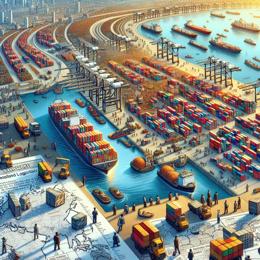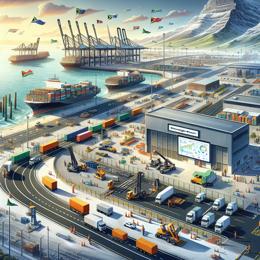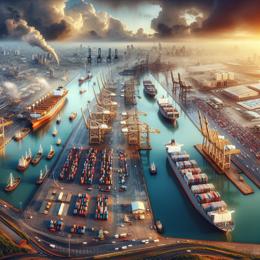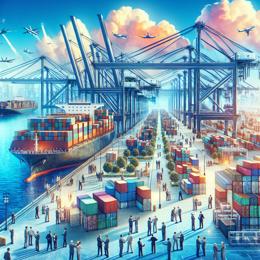Image created by AI
Maersk Issues Warning on Severe Weather Disruptions Along South African Coastline
Global shipping giant A.P. Moller-Maersk has issued a stern warning about imminent delays in shipping operations along the South African coast. The culprit: an intense cold front that is not only blanketing some regions of South Africa with snow but is also whipping up destructive coastal winds, resulting in rainfall and waves that are threatening both infrastructure and navigation.
The South African Weather Service, after assessing the approaching weather systems, released a forecast on Sunday detailing the hazardous conditions anticipated, including waves that could reach up to 10 meters in the southwest. The forecast places emphasis on the perilous combination of gale to strong gale-force north-westerly to westerly winds alongside heavy rainfall sweeping across the coastal regions. These conditions are expected to persist into the Monday of that week.
In their statement, released on Monday, Maersk highlighted the repercussions of the adverse weather, predicting that "vessel movement and operations" will be serious affected, particularly along the stretch of coastline linking Cape Town to Port Elizabeth. Among the repercussions are alterations to shipping routes, with vessels expected to seek shelter or detour to circumvent the affected areas. Such adjustments are anticipated over the course of the following few days, signaling a ripple of delays through the global maritime trade routes.
The timing is particularly troubling for South Africa’s traffic-heavy coastal waters. There has been a notable uptick in cargo vessels opting for the Cape of Good Hope route as a safer alternative to the piracy-prone waters of the Red Sea. At present, around 690 vessels are navigating this southern circumnavigation, and the intensity of the cold front's impact is most profound in container shipping.
Maersk's warning comes at a time when Transnet, South Africa's state-owned logistics company, is already confronting challenges in improving the performance of its ports. Transnet has been vigorously seeking private investment and procuring more resilient equipment capable of withstanding extreme weather. Global evaluations, such as a recent World Bank study, have placed South African harbors among the lowest performing worldwide—a ranking that Transnet contests but nonetheless points to the need for infrastructural improvements.
The extreme weather conditions serve as a stark reminder of the fragility of global shipping networks when faced with the might of nature. As shifting climate patterns and increasing incidents of severe weather events become more commonplace, shipping companies, and the logistics industry as a whole, may need to further adapt their strategies to mitigate the impact on global supply chains.










